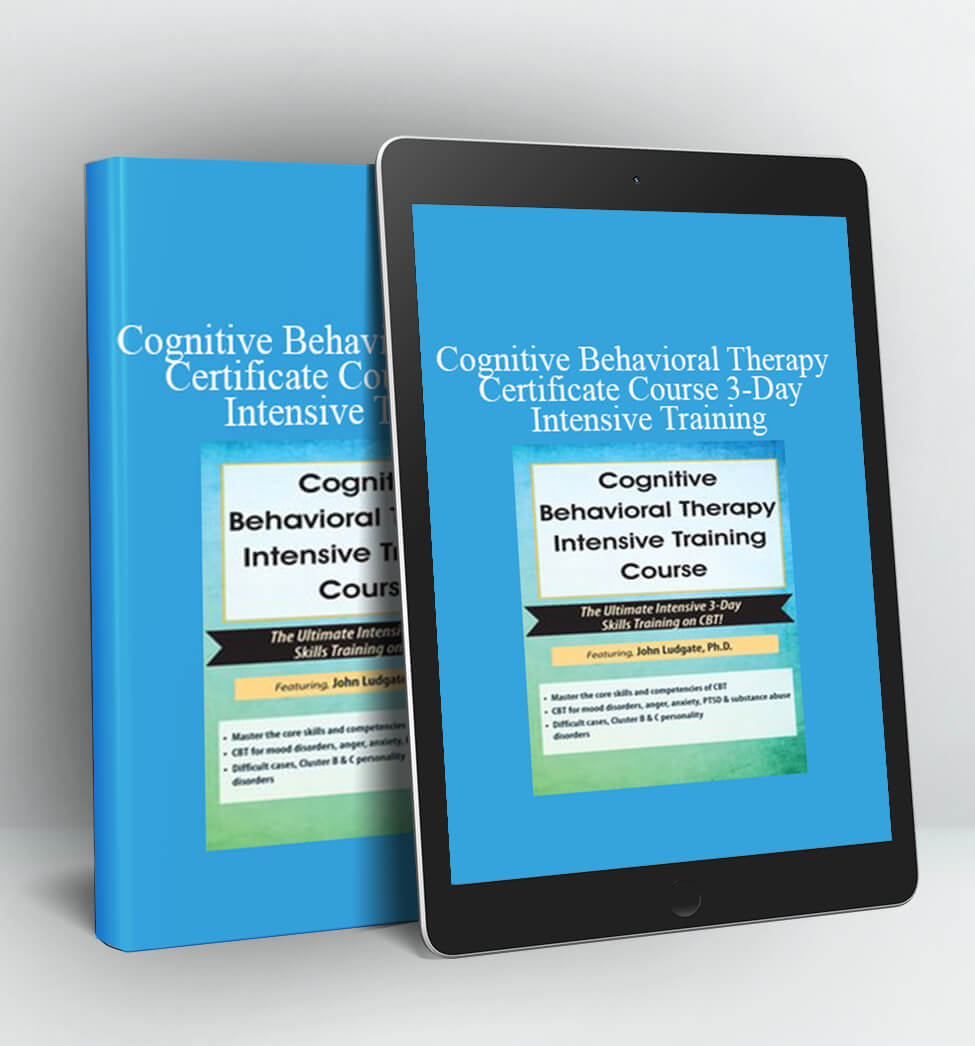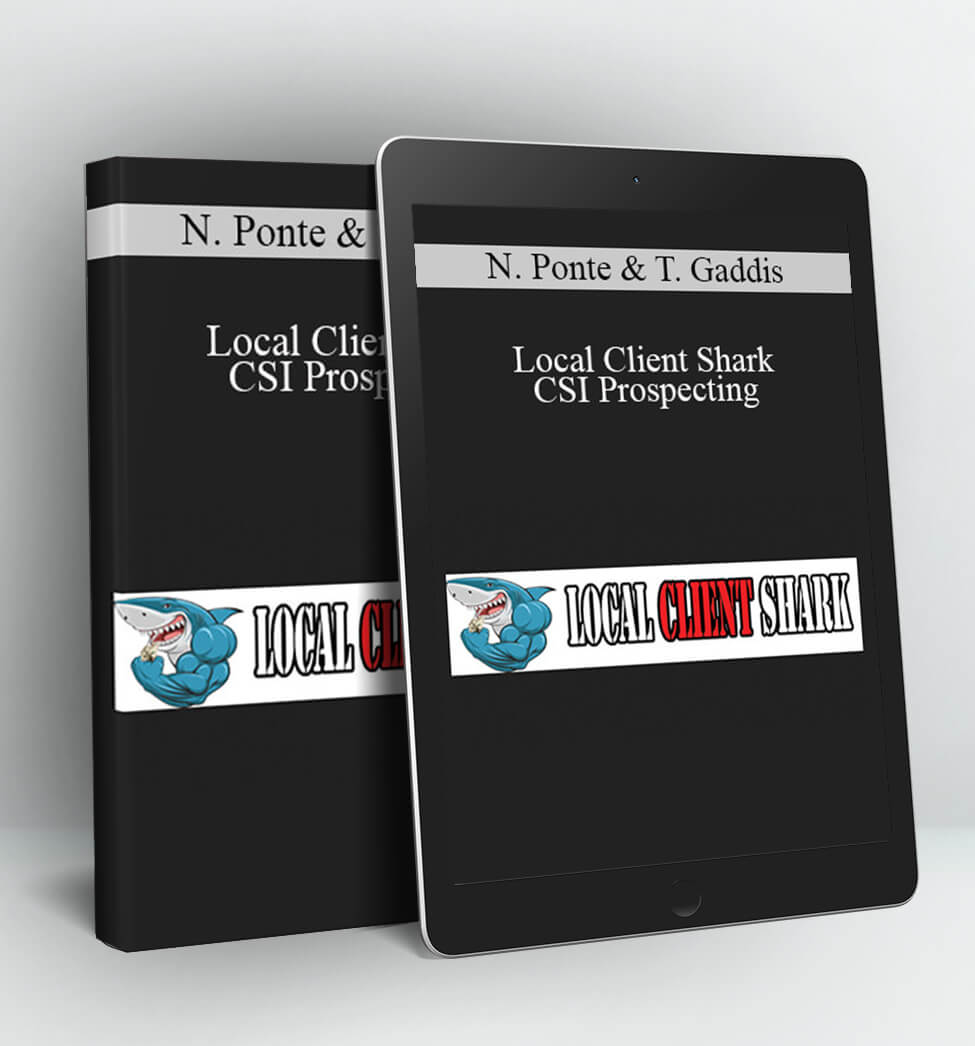Cognitive Behavioral Therapy Certificate Course 3-Day Intensive Training
- Master the core skills and competencies of CBT
- CBT for mood disorders, anger, anxiety, PTSD & substance abuse
- Difficult cases, Cluster B & C personality disorders
Join in for this breakthrough Cognitive Behavioral Therapy (CBT) Certificate Course to develop core competencies and transform your skills to achieve better therapeutic outcomes, even with your most challenging clients!
You will be able to utilize concrete strategies that will provide greater healing for your clients who suffer from:
- Mood disorders
- Anger
- Anxiety disorders
- PTSD
- Substance abuse
- Personality disorders
- Suicidality
- And many more challenging clients!
You’ll get effective clinical techniques from Dr. John Ludgate, trained at the Beck Institute of Cognitive Therapy. He will teach you how to master the art of applying CBT to a variety of clinical populations. Join him for this revolutionary experience as he reveals the latest advances in CBT to get the skills you need to succeed!
Through case studies, interactive discussions, role-plays, and reproducible handouts, you will take away practical CBT strategies to use immediately with any client. Leave this certificate course armed with tools you can use in your very next session.
Don’t miss out –register now!
OUTLINE
MASTER THE CORE SKILLS AND COMPETENCIES OF CBT
Foundations in CBT
- Evolution of Cognitive Behavioral Therapies
- Neurobiological Findings
- Outcome Studies
Treatment Concepts
- Socialization to Treatment Model
- Levels of Cognition
- Eliciting & Labeling Distortions
- Identify & Evaluate Automatic Thoughts
Offshoot Models
- Third Wave Approaches
- DBT
- Acceptance & Commitment Therapy
- Schema Therapy
The Therapeutic Relationship
- Establish Rapport
- Ruptures in the Therapeutic Alliance
- Predictive of Outcome
Cognitive Conceptualization
- Case Formulation
- Collaborative Empiricism
- Symptom Driven Treatment Planning
Key Components of CBT Practice
- Structure
- Feedback
- Guided Discovery
- Collaborative Empiricism
- Homework
Application to Clinical Practice
- Case Studies/Role Plays
CBT FOR MOOD DISORDERS, ANGER, ANXIETY, PTSD & SUBSTANCE ABUSE
CBT for Mood Disorders
- Cognitive Model of Depression
- Behavioral Activation
- Sleep Hygiene
- Activity Monitoring & Scheduling
- Modify Negative Cognitions
- Gratitude & Meaning
- Depressive Relapse
- Bipolar Disorder
CBT for Anger
- Cognitive Model of Anger
- Role of Values & “Moral Resistance”
- Symptom Management
CBT for Anxiety
- Generalized Anxiety
- Cognitive Model of Anxiety
- “Worry Cure”
- Phobias
- Hierarchy Work
- Desensitization
- Panic Disorder
- Cognitive Model of Panic
- Interoceptive Strategies
CBT for OCD
- Intrusive Thoughts
- Metacognitive Strategies
- Behavioral Experiments
CBT for PTSD
- Prolonged Exposure
- Cognitive Reprocessing
- Trauma Narratives
CBT for Substance Abuse
- Impulse Control Models
- Monitor Cravings & Resist Urges
- Relapse Prevention
Application to Clinical Practice
- Case Studies/Role Plays
DIFFICULT CASES, CLUSTER B & C PERSONALITY DISORDERS
Overview of CBT for Challenging Cases
- Why are they challenging?
- Adaptations in CBT
- Modified Expectations for the Therapist
Treatment Model
- Early Maladaptive Schemas
- Breaking Destructive Behavioral Cycles
- Belief Modification Protocol
CBT for Cluster B Personality Disorders
- Antisocial
- Psychopathy
- Behavior Management
- Narcissistic
- Subtypes of Narcissism
- Schema Mode Work
- Histrionic
- Schema Modification
- Constructive Alternatives for “Getting Noticed”
- Borderline
- DBT-Based Strategies
- Emotion Regulation Skills
- Distress Tolerance Skills
- Interpersonal Effectiveness Skills
CBT for Cluster C Personality Disorders
- Modifying Avoidant Schemas and Strategies
- Changing Dependent Beliefs and Behaviors
- OCPD: Interventions and Strategies
Advanced Strategies for Cluster B Personality Disorders
- Modify Deep Seeded Beliefs
- Continuum Work
- Construct New Beliefs
- Internalization Exercises
- Build Resilience
- Cognitive Behavioral Chain Analysis
- Schema Mode Work
CBT for Suicidal Clients
- CBT Model of suicide
- Risk Assessment
- Strategies for Suicidal Ideation and Hopelessness
- Reasons for Living Inventories
OBJECTIVES
- Apply Evidence Based CBT techniques to multiple symptom sets.
- Describe methods for conducting CBT psychoeducation to elicit “buy in” from most difficult clients.
- Identify, challenge and modify dysfunctional self-talk, thoughts and core beliefs.
- Develop case conceptualization skills for treating any DSM-5® condition.
- List the key components of CBT practice.
- Implement rapport-building tips and tools to improve client relationships.
- Describe key behavioral activation strategies useful for alleviating treatment-resistant depression.
- Develop strategies for treating depressive relapses.
- Implement cognitive behavioral methods to overcome intrusive, obsessive-compulsive thoughts.
- Illustrate key strategies for impulse control used to treat substance use-disorders.
- Describe exposure and cognitive processing interventions used to treat PTSD and trauma.
- Utilize cognitive reprocessing for clients with PTSD.
- List symptom management strategies for personality disorders.
- Apply DBT skills training for borderline personality disorder.
- Summarize the role of early maladaptive schemas in maintaining chronic conditions.
- Utilize schema-based strategies for breaking lifelong destructive behavioral cycles.
- Describe eight motivations for parasuicidal behaviors and how to effectively intervene for each motivation.
- Discuss how family dynamics are affected by an individual with borderline personality disorder and discover how to improve family communication.
- Acquire suicide assessment skills and learn how to document to minimize liability.
Proof Content:
https://www.loom.com/i/5bf41f69e451487090f937a92f83f191
Delivery Method:
After your purchase, you’ll get access to the downloads page. Here, you can download all the files associated with your order.
Downloads are available once your payment is confirmed, we’ll also send you a download notification email separate from any transaction notification emails you receive from Vinlearn





